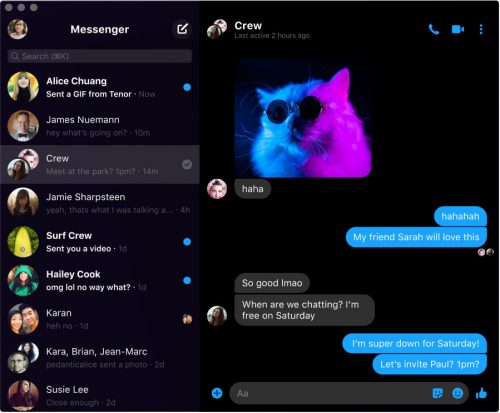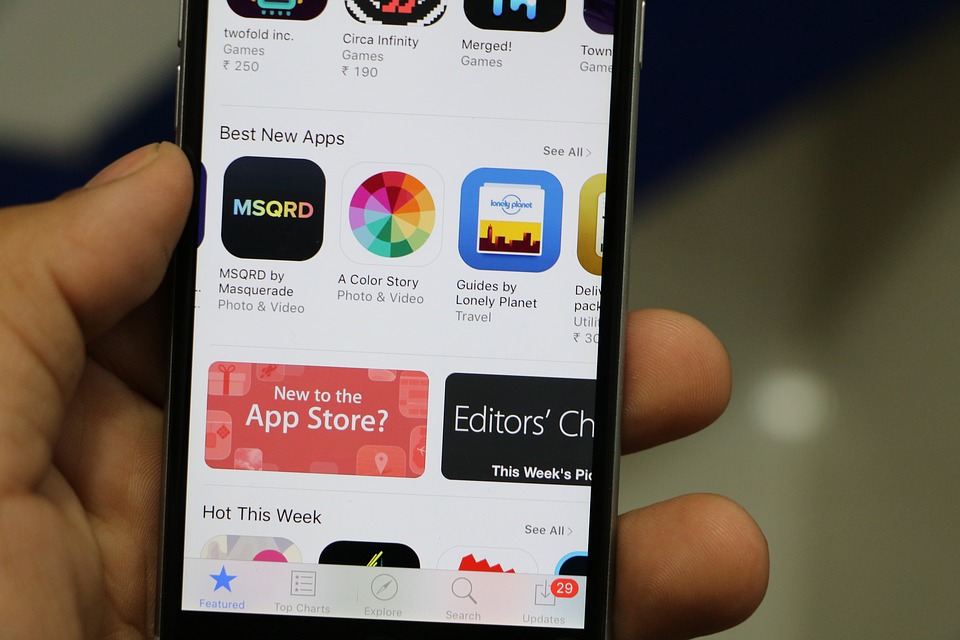Facebook Messenger Mac App Swift
Basically, the newly released Facebook Messenger app is a full-featured replica of the browser version and mobile app. It has all the same superpowers and is as customizable as the original one. It also establishes the same philosophy — an easy way to message and video chat with your loved ones.
Facebook Messenger Mac App Swift Pro
- Facebook is building an as-yet-unreleased Facebook Messenger app for Mac desktop that would help Apple users to instantly access it straight from the dock, a media report said.
- Download latest version 0.0 (requires Mac OS 10.10 or newer). Disclaimer: This is not an official Facebook product. It's a free and open-source project created by fans of Messenger.
- Hang out anytime, anywhere - Messenger makes it easy and fun to stay close to your favorite people.
- Facebook Messenger is finally getting desktop apps almost 9 years after its debut. After seeing over a 100% increase in desktop browser audio and video calling, Messenger today releases its Mac.
With millions of people locked down in their houses, the internet is the only way to communicate with our loved ones, friends, and colleagues. Now more than ever, we are relying on technologies to stay connected and join those virtual events such as classes, office meetings, and more. There is no shortage of online services and apps to communicate and collaborate online. In the time when everyone seems to have moved to Zoom to host or attend online meetings and classes, Facebook Messenger remains a top player in online communication and messaging platform.
Facebook Messenger is already available for almost all kinds of platforms, including Android, iOS, and other mobile platforms. For desktop users, it has a web version that you can access from messenger.com. The web version supports all the desktop platforms and has all the features, including group video calls, text messages, files, and images. Now Facebook has launched a native desktop app for Windows and Mac.
The native app does everything the mobile app does, including voice and video chat, group video calls, send text, images, and files among contacts and many more. The native app also comes with dark mode support, similar to what Facebook has been testing with its new desktop version redesign.
The Messenger desktop app for Windows and Mac was a long time due. Facebook first announced the possible Messenger desktop app last year during its annual F8 Conference.
“People want to seamlessly message from any device, and sometimes they just want a little more space to share and connect with the people they care about most.” – Facebook had said last year when asked about the messenger app. The app was supposed to launch this year during its annual F8 Conference 2020. But like most other events this year, F8 has been also canceled due to the novel Coronavirus (COVID-19) outbreak.
So, instead of launching it in an event, Facebook has decided to launch it as it is. The timing of the launch is also very interesting as most people flocking towards online tools and services to communicate during this period of hardship and lockdown. Currently, the most popular cross-platform web conferencing tool Zoom is gaining popularity. Zoom is also facing backlash due to its lousy privacy policy. With the launch of Facebook Messenger desktop app, Facebook is hoping to join the increasing list of video conferencing tool to connect with others during this social distancing period.
You can download and install the Facebook messenger app for macOS from Mac App Store and for Windows from Microsoft Store.
If you are someone who was looking for a Zoom alternative and prefers a native app instead of a web version, Facebook Messenger might be something to try.
With purchase after purchase, milestone surpassed after milestone surpassed, Facebook continues its slow suffocation of the internet. You, a thinking person who values your privacy and sees the Mark Zuckerberg-helmed behemoth as complicit in an array of real-world suffering, want out.
But with Facebook operating the world's largest messaging apps — the company owns both Instagram and WhatsApp in addition to the familiar, now ominous shade of blue that accompanies Messenger — many messaging options of the digital age correctly feel tainted. Thankfully, there are plenty of non-Facebook-owned ways to communicate with friends and family that are easy, secure, private, and reliable.
Going Facebook-free has never been easier. Here are some non-Facebook-owned messaging options to get you started.

The best messaging apps
1. Signal
Signal is great in all the ways Facebook isn't, and then some.
The free messaging app works on Android and iOS, and on both Macs and PCs. You can send written messages, make voice and video calls, send voice memos, and have massive group chats — just like you would on Apple's iMessage.
Signal is an independent nonprofit, and it's recommended by experts. It stores virtually no information about its users, and all your communication sent via the app is end-to-end encrypted. Even when law enforcement does come knocking, Signal claims it has practically nothing on its users to turn over.
There are no 'safe' jurisdictions anymore, only safe services. This is the entirety of what the DOJ's jurisdiction got them: pic.twitter.com/xnQ5tW58FD
— Signal (@signalapp) October 4, 2016
'We can't read your messages or listen to your calls, and no one else can either,' Signal explains on its website. 'There are no ads, no affiliate marketers, and no creepy tracking in Signal.'
Using the app is intuitive. If you can use WhatsApp or Messenger, you'll have no trouble using Signal. So give it a try, and relegate Facebook to its rightful place — that of the bad taste in your mouth that you're currently in the process of washing out.
2. iMessage
Apple's iMessage is the greatest messaging app you never realized you were already using.
The app, native to Mac devices, lets you send text-based messages, videos, GIFs, and voice memos. If you're communicating with another Mac user, and you see that blue bubble (as opposed to a green bubble), your messages are default end-to-end encrypted — putting Facebook's Messenger to shame.
Facebook Messenger Mac App Swift Hack
Of course, there are some drawbacks to iMessage. For starters, unlike Signal, it requires an Apple device. What's more, even if you do have an iPhone or iPad, messages sent to Android-sporting friends and family via iMessage are traditional SMS text messages — this means they're not encrypted.
Overall, it's a great app. It's just a bummer that it's limited to Mac.
The likely better than Facebook
When looking for an alternative to Facebook, it's important to ask yourself why you're trying to rid yourself of that particular scourge. If your privacy is the driving factor (or any factor, really), then you're best sticking with the options listed above. However, if your concern lies not with matters of privacy, but is instead, say, a reaction to Facebook's disastrous effect on civil rights, these are some options you might want to consider.
3. Google Duo
Google may not be the most privacy-friendly company, but it does make products that work. Google Duo is one such app, available on both iOS and Android, that lets you make video calls with multiple participants.
SEE ALSO: Why you shouldn't use Facebook's Messenger Rooms: A non-exhaustive list

Like Signal video calls, Duo calls are end-to-end encrypted by default, which means the content of the calls is protected from prying eyes and ears. Unlike Signal, however, the app likely collects a ton of metadata on its users. The Mozilla Foundation, a nonprofit working to keep the internet 'open and accessible to all,' notes in its Privacy Not Included guide that 'Google collects information on users that includes name, birthday, gender, phone number, email, location, contacts you add, and apps you use.'
In the end, you might as well use Signal. However, Duo is still a better option than Facebook.
Messenger App For Mac
4. Zoom
Yes, Zoom. Sure, the video-call app has its share of problems. However, the company behind the app promises it's working to solve them.
Available on desktop and both iOS and Android, the conferencing app skyrocketed to popularity as the coronavirus pandemic forced people to stay inside for months on end. While the app initially presented serious privacy concerns, Zoom has taken real and serioussteps to address them.
Specifically, Zoom will offer all users end-to-end encryption. However, like with Facebook Messenger, the feature is not enabled by default. Also, while there is free version of the app, to get the full benefits you have to pay up — $14.99 a month for the 'pro' version. However, at least with Zoom the exchange is clear: You give the company money, and it gives you a service.
SEE ALSO: How to use Jitsi Meet, an open source Zoom alternative
Facebook Messenger Mac Download
With Facebook, it's not always obvious what the company is taking from you in exchange for the joy of being continuously bathed in COVID-19 misinformation.
So delete your Facebook account, delete your Instagram account, delete your WhatsApp account, and start living that Facebook-free life. There are other options out there, all you have to do is use them.
